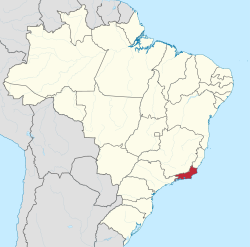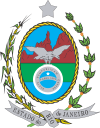Rio de Janeiro state
| Rio de Janeiro | |||
|---|---|---|---|
| State | |||
|
Estado do Rio de Janeiro State of Rio de Janeiro |
|||
|
|||
| Motto: Recte Rem Publicam Gerere (Latin) "Conduct the affairs of the public with righteousness" |
|||
| Anthem: November 15th | |||
 Location of the State of Rio de Janeiro in Brazil |
|||
| Coordinates (Brazil): 22°54′S 43°12′W / 22.900°S 43.200°WCoordinates: 22°54′S 43°12′W / 22.900°S 43.200°W | |||
| Country |
|
||
| Capital and largest city |
|
||
| Government | |||
| • Governor | Luiz Fernando Pezão (PMDB) | ||
| • Vice Governor | Francisco Dornelles (PP) | ||
| Area | |||
| • Total | 43,696.1 km2 (16,871.2 sq mi) | ||
| Area rank | 24th | ||
| Population (2012) | |||
| • Total | 16,231,365 | ||
| • Rank | 3rd | ||
| • Density | 370/km2 (960/sq mi) | ||
| • Density rank | 2nd | ||
| Demonym(s) | Fluminense | ||
| GDP | |||
| • Year | 2013 estimate | ||
| • Total | US$368.423 billion (2nd) | ||
| • Per capita | US$22.507 (3rd) | ||
| HDI | |||
| • Year | 2010 | ||
| • Category | 0.761 – high (4th) | ||
| Time zone | BRT (UTC-3) | ||
| • Summer (DST) | BRST (UTC-2) | ||
| Postal Code | 20000-000 to 28990-000 | ||
| ISO 3166 code | BR-RJ | ||
| Website | rj.gov.br | ||
Rio de Janeiro (Portuguese pronunciation: [ˈʁi.u dʒi ʒɐˈnejɾu]) is one of the 27 states of Brazil. It has the second largest economy of Brazil, with the largest being that of the state of São Paulo.
The state of Rio de Janeiro is located within the Brazilian geopolitical region classified as the Southeast (assigned by IBGE). Rio de Janeiro shares borders with all the other states in the same Southeast macroregion: Minas Gerais (N and NW), Espírito Santo (NE) and São Paulo (SW). It is bounded on the east and south by the Atlantic Ocean.
Rio de Janeiro has an area of 43,653 km². Its capital is the city of Rio de Janeiro, which was the capital of the Portuguese Colony of Brazil from 1763 to 1815, of the United Kingdom of Portugal, Brazil and the Algarves from 1815 to 1822, and of independent Brazil from 1822 to 1960.
The archaic demonym meaning for the Rio de Janeiro State is "fluminense", taken from the Latin word flumen, meaning "river." Despite the fact "carioca" is a most ancient demonym of Rio de Janeiro's inhabitants (known since 1502), it was replaced by "fluminense" in 1783, when it was sanctioned as the official demonym of the Real Captainship of Rio de Janeiro (later Province of Rio de Janeiro), a few years after the City of São Sebastião do Rio de Janeiro has become the capital city of the Brazilian colonies. From 1783 and during all the Imperial Regime, "carioca" remained only as a nickname by which other Brazilians called the inhabitants of Rio (city and province). During the first years of the Brazilian Republic, "carioca" was the name given to those who lived in the slums or a pejorative way to refer the bureaucratic elite of the Federal District. Only when the City of Rio lost its status as Federal District and became a Brazilian State (Guanabara State) when the capital was moved to Brasilia, "carioca" was made a co-official demonym with "guanabarino". In 1975, the Guanabara State was extinct by President Geisel (under the military dictatorship) becoming the present City of Rio de Janeiro and "carioca" was made the demonym of its municipality. Although "carioca" is not recognized as an official demonym of Rio de Janeiro State, Brazilians call the inhabitants of Rio de Janeiro in general (State and city) "cariocas," and most of its inhabitants claim to be "cariocas". Nowadays, social movements like "Somos Todos Cariocas" ("We are all Cariocas") try to achieve the official recognition of "carioca" as a co-official demonym of Rio de Janeiro State.
...
Wikipedia


